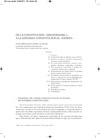Identificador persistente para citar o vincular este elemento:
https://accedacris.ulpgc.es/jspui/handle/10553/73346
| Campo DC | Valor | idioma |
|---|---|---|
| dc.contributor.author | López Aguilar, Juan Fernando | en_US |
| dc.date.accessioned | 2020-06-17T12:10:06Z | - |
| dc.date.available | 2020-06-17T12:10:06Z | - |
| dc.date.issued | 2012 | en_US |
| dc.identifier.issn | 1139-5583 | en_US |
| dc.identifier.other | WoS | - |
| dc.identifier.uri | https://accedacris.ulpgc.es/handle/10553/73346 | - |
| dc.description.abstract | From the viewpoint of comparative constitutional law, the 1978 Spanish Constitution happens to be one of the most rigid. Its Title X provides with two constitutional reform procedures, both characterized by the need of wide parliamentary majorities (3/5, simplified reform; 2/3, aggravated review). The latter qualifies by the requirement of a dual expression of a majority of 2/3, with dissolution of Parliament followed by new elections, as well as with a mandatory referendum for ratification. Significantly, the Spanish Constitution expressly excludes the popular initiative in the process of reform. This explains, in legal terms, the enormous difficulties with which the debate on amending the Constitution has been raised in Spain, so that it has only occurred twice in 35 years (1992 and 2011), in very different contexts, but coinciding in its connection with the coordinates imposed by Spain's commitments with the EU.From the perspective of comparative politics, instead, Spanish democracy is distinguished for being among those that have undertaken and solved with more difficulties the maturity test, which involves the normalization of the debate on the constitutional reform. After a prolonged period of rejection of its approach (claiming the "fragility" of the constituent pact and the impossibility of tackling any revision with a consensus resembled to the transition's one), the last parliamentary term (2008-2011) has broken the taboo of the "intangibility" of the Spanish Constitution, paving the way for a reform of its art. 135 (public accounts balance and consequent monitoring of the deficit and debt of Public Administrations according to the parameters established by the EU), whose surprising announcement, accelerated management and urgent parliamentary procedure call for an overall to a rethinking of a number of theoretical categories which have been long settled regarding the reform, the constitutional revision and mutation, as well as the opposing vectors (integration vs. differentiation) that underlie the debate on the reform of the State structure, as well as the second Chamber (Senate), so often postponed as still pending and, therefore, yet argued. | en_US |
| dc.language | spa | en_US |
| dc.relation.ispartof | Teoría y Realidad Constitucional | en_US |
| dc.source | Teoria Y Realidad Constitucional [ISSN 1139-5583], n. 29, p. 199-218, (2012) | en_US |
| dc.subject | 560504 Derecho constitucional | en_US |
| dc.subject.other | Constituent Power | en_US |
| dc.subject.other | Constitutional Reform | en_US |
| dc.subject.other | Constitutional Review | en_US |
| dc.subject.other | Constitutional Mutation | en_US |
| dc.subject.other | "Golden Rule" On Budgetary Stability | en_US |
| dc.subject.other | Institutional Blockade | en_US |
| dc.subject.other | Politics Of Dissent And Anger Vs. Consensual Politics | en_US |
| dc.subject.other | Reforma Constitucional | en_US |
| dc.title | De la constitución "irreformable" a la reforma constitucional "exprés" | en_US |
| dc.title.alternative | From the "unamendable" Constitution to the "fast track" Amending Procedure | en_US |
| dc.type | info:eu-repo/semantics/Article | en_US |
| dc.type | Article | en_US |
| dc.identifier.scopus | 84864806081 | - |
| dc.identifier.isi | 000421238800006 | - |
| dc.contributor.authorscopusid | 57078552300 | - |
| dc.description.lastpage | 218 | en_US |
| dc.description.firstpage | 199 | en_US |
| dc.relation.volume | 29 | en_US |
| dc.investigacion | Ciencias Sociales y Jurídicas | en_US |
| dc.type2 | Artículo | en_US |
| dc.contributor.daisngid | 3637398 | - |
| dc.description.numberofpages | 20 | en_US |
| dc.utils.revision | Sí | en_US |
| dc.contributor.wosstandard | WOS:Aguilar, JFL | - |
| dc.date.coverdate | Agosto 2012 | en_US |
| dc.identifier.ulpgc | Sí | en_US |
| dc.description.sellofecyt | Sello FECYT | |
| dc.description.esci | ESCI | |
| item.grantfulltext | open | - |
| item.fulltext | Con texto completo | - |
| crisitem.author.dept | GIR Problemas jurídicos actuales | - |
| crisitem.author.orcid | 0000-0002-6564-2536 | - |
| crisitem.author.parentorg | Departamento de Derecho Público | - |
| crisitem.author.fullName | López Aguilar, Juan Fernando | - |
| Colección: | Artículos | |
Citas SCOPUSTM
11
actualizado el 08-jun-2025
Citas de WEB OF SCIENCETM
Citations
6
actualizado el 25-feb-2024
Visitas
57
actualizado el 10-ene-2026
Descargas
59
actualizado el 10-ene-2026
Google ScholarTM
Verifica
Comparte
Exporta metadatos
Los elementos en ULPGC accedaCRIS están protegidos por derechos de autor con todos los derechos reservados, a menos que se indique lo contrario.
